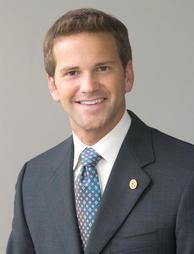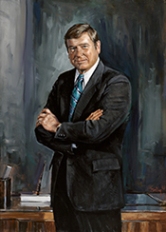Aaron Schock 1st of 234 Illinois GOP US Representatives to Resign in Scandal
Only four of the 470 Illinois U.S. House members in history have resigned under a cloud of scandal – three in the last 20 years

Political scandals, of course, are nothing new in Illinois with multiple high profile politicians landing in prison all the way up to the governor’s office.
However, until the last few decades, it has been extremely unusual for Illinois U.S. Representatives to resign amid controversy.
A Smart Politics study of congressional tenures finds Aaron Schock is the first of the 234 Illinois Republican U.S. Representatives in history to resign due to scandal and just the fourth out of all 470 members to serve since statehood.
Overall, approximately one in 13 Illinois U.S. House members have resigned from the chamber since statehood – 36 of 470 (7.7 percent).
However, all but four of these 36 exited the chamber without controversy – usually having been elected or appointed to a new political post.
Of the four to resign in scandal – three did so in the last 20 years.
Democrat James McDermott was the first Illinois U.S. House member to resign amid controversy, on July 21, 1914.
McDermott was in his fourth term representing Illinois’ 4th CD when he was implicated in a lobbying scandal.
The Democrat, who represented Chicago’s stockyards district, had been accused of being a paid lobbyist for the National Association of Manufacturers and being guilty of “gross improprieties” such as use of his room by agents of the association and “seeking loans from Washington pawnbrokers having legislation before Congress” according to the July 21, 1914 edition of the Chicago newspaper The Day Book.
Arkansas Democrat John Floyd of the Judiciary Committee sought to censure McDermott while fellow committee member John Nelson of Wisconsin filed a minority report recommending his expulsion.
By resigning, the lobbying charges disappeared and McDermott ran to win back his seat that November and did so easily by 27.5 points to serve a fifth term through March 1917. He did not seek a sixth term in 1916.

Reynolds resigned on October 1, 1995 – more than two months after a Cook County jury found him guilty on counts of criminal sexual abuse, child pornography, and obstruction of justice.
The Chicago Congressman had been indicted in August 1994 in a case that centered around his having sex with a campaign intern who was under the age of 18.
Even still, Reynolds was reelected to a second term without opposition on the November 1994 ballot.
He spent over two years in jail on these charges and was later convicted in federal court for bank and campaign fraud. President Bill Clinton commuted Reynolds’ sentence in 2001.
Reynolds attempted a few political comebacks but won only 5.9 percent of the 2004 Democratic primary vote against his successor, Jesse Jackson, Jr., and came in a distant 8th place with only 0.8 percent of the vote in a 2013 special primary won by Robin Kelly to fill Jackson’s open seat.
Jesse Jackson, Jr. was the third and most recent Illinois U.S. Representative to resign under scandal prior to Schock.
Jackson replaced Reynolds in a 1995 special election and would serve nine terms before his resignation on November 21, 2012 – shortly after being reelected to a 10th term by 40 points.
The Chicago Democrat won that race despite news that federal authorities had launched an investigation into his misallocation of campaign funds for personal use less than a month before Election Day.
Jackson eventually pled guilty to the charges and was sentenced to prison in August 2013.
Schock, meanwhile, becomes the first of 234 Republicans to serve in the state’s U.S. House delegation to resign while under investigation.
Of the 32 previous Illinois U.S. House members to resign, five did so after winning election to the U.S. Senate:
● Democrat Stephen Douglas (March 3, 1847) after winning a third term to the state’s 5th CD. Douglas was later elected to the Senate and resigned on the last day of the 29th Congress
● Democrat William Richardson (January 29, 1863) after his sixth nonconsecutive term. Richardson had also resigned after his first stint in the chamber from 1847 to 1856, after becoming his party’s gubernatorial nominee
● Democrat Lyman Trumbull (1855) won election to the 8th CD in 1854 as an Anti-Nebraska Democrat, but resigned his seat before taking office in the U.S. House after winning election to the U.S. Senate
● Republican William Lorimer (June 17, 1909) resigned after five non-consecutive terms
● Republican Mark Kirk (November 29, 2010) resigned after five terms
A sixth, four-term Republican Thomas Corcoran, resigned on November 28, 1984 after a failed bid to win the GOP U.S. Senate nomination.
Eight others were appointed or elected to the bench: Democrats James Major (U.S. District Court, 1933) William Arnold (U.S. Board of Tax Appeals, 1935), Harry Beam (Chicago municipal court, 1942), Edward Finnegan (Cook County Circuit Court, 1964), and Abner Mikva (U.S. Court of Appeals, 1979) and Republicans William Graham (U.S. Court of Customs Appeals, 1924), Thomas Williams (U.S. Court of Claims, 1929), and George Howell (U.S. Court of Claims, 1947).
Three congressmen were elected to executive office: Jacksonian Joseph Duncan (Governor, 1834), Republican John Beveridge (Lieutenant Governor, 1873), and Democrat Harold Washington (Mayor of Chicago, 1983).
Three resigned for military service: Whig Edward Baker (U.S.-Mexican War, 1847) and Democrats John McClernan (Civil War, 1861) and John Logan (Civil War, 1862).
Seven others were appointed into positions within the executive branch: Democrat John Black (U.S. Attorney, 1895), Republican Elihu Washburn (Secretary of State, 1869), Democrat Michael Igoe (U.S. Attorney, 1935), Republican Donald Rumsfeld (Assistant and Director of the Office of Economic Opportunity, 1969), Republican Charlotte Reid (to the Federal Communications Commission, 1971), Republican Edward Madigan (Secretary of Agriculture, 1991), and Democrat Rahm Emanuel (White House Chief of Staff, 2009).
Two resigned to enter the private sector: Republicans Burton Cook (General Solicitor of the Chicago and North Western Railway Company, 1871) and Denny Hastert (D.C. lobbyist, 2007).
Three others opted not to run for reelection but simply resigned a few days before the end of their terms: Democrat Anton Maciejewski (1942), Republican Leslie Arends (1974), and Democrat Kenneth Gray during his first stint in Congress (1974).

Rostenkowski instead lost his 5th CD general election in 1994 to Republican Michael Flanagan – a half-year after being forced to step down from his chairmanship post. That seat would go back to the Democrats in the next cycle – appropriately to Rod Blagojevich.
Rostenkowski was eventually pardoned by President Clinton.
Despite Schock’s resignation, Democrats should not be too optimistic about claiming his seat in the special election to be held later this year.
Schock won his 2014 reelection bid by nearly 50 points and his 18th CD has the second largest Republican tilt in the state with a +11 GOP Partisan Voting Index score.
Moreover, of the previous three-dozen U.S. House resignations in Illinois history, only five resulted in a change in partisan control of the district when the next U.S. Representative was seated:
● 5th CD in 1863: From Democrat William Richardson to Republican Owen Lovejoy
● 24th CD in 1930: From Republican Thomas Williams to Democrat Claude Parsons
● 21st CD in 1949: From Republican George Howell to Democrat Peter Mack
● 10th CD in 1980: From Democrat Abner Mikva to Republican John Porter
● 14th CD in 2008: From Republican Denny Hastert to Democrat Bill Foster
Illinois U.S. Representatives Who Resigned from Office
|
US Rep
|
#
|
Party
|
Resigned
|
Reason
|
|
Joseph Duncan
|
3
|
Jacksonian
|
September 21, 1834
|
Elected governor
|
|
Edward Baker
|
7
|
Whig
|
January 15, 1847
|
U.S.-Mexican War service (colonel of 4th Regiment, Illinois Volunteer Infantry)
|
|
Stephen Douglas
|
5
|
Democrat
|
March 3, 1847
|
Elected U.S. Senator
|
|
Lyman Trumbull*
|
8
|
Democrat
|
February 1855
|
Elected U.S. Senator
|
|
William Richardson
|
5
|
Democrat
|
August 25, 1856; January 29, 1863
|
Won nomination for governor; Elected U.S. Senator
|
|
John McClernand
|
6
|
Democrat
|
October 28, 1861
|
Civil War service (commissioned brigadier general)
|
|
John Logan
|
9
|
Democrat
|
April 2, 1862
|
Civil War service (commissioned brigadier general)
|
|
Elihu Washburne
|
3
|
Republican
|
March 6, 1869
|
Appointed U.S. Secretary of State
|
|
Burton Cook
|
6
|
Republican
|
August 26, 1871
|
Appointed General Solicitor of Chicago & North Western Railway Company
|
|
John Beveridge
|
AL
|
Republican
|
January 4, 1873
|
Elected Lieutenant Governor
|
|
John Black
|
AL
|
Democrat
|
January 12, 1895
|
United States attorney for the northern district of Illinois
|
|
William Lorimer
|
6
|
Republican
|
June 17, 1909
|
Elected U.S. Senator
|
|
James McDermott
|
4
|
Democrat
|
July 21, 1914
|
Lobbying misconduct
|
|
William Graham
|
14
|
Republican
|
June 7, 1924
|
Appointed U.S. Court of Customs Appeals Judge
|
|
Thomas Williams
|
24
|
Republican
|
November 11, 1929
|
Appointed U.S. Court of Claims Judge
|
|
James Major
|
21
|
Democrat
|
October 6, 1933
|
Appointed U.S. District Court Judge (Southern District of Illinois)
|
|
Michael Igoe
|
AL
|
Democrat
|
June 2, 1935
|
Appointed U.S. Attorney for the northern district of Illinois
|
|
William Arnold
|
23
|
Democrat
|
September 16, 1935
|
Appointed to U.S. Board of Tax Appeals
|
|
Harry Beam
|
4
|
Democrat
|
December 6, 1942
|
Elected Chicago municipal court judge
|
|
Anton Maciejewski
|
6
|
Democrat
|
December 8, 1942
|
Did not run for reelection
|
|
George Howell
|
21
|
Republican
|
October 5, 1947
|
Appointed U.S. Court of Claims judge
|
|
Edward Finnegan
|
9
|
Democrat
|
December 6, 1964
|
Appointed Circuit Court Judge of Cook County, Ill
|
|
Donald Rumsfeld
|
13
|
Republican
|
May 25, 1969
|
Appointed Assistant and Director of the Office of Economic Opportunity
|
|
Charlotte Reid
|
15
|
Republican
|
October 7, 1971
|
Appointed to Federal Communications Commission
|
|
Leslie Arends
|
17
|
Republican
|
December 31, 1974
|
Did not run for reelection
|
|
Kenneth Gray
|
22
|
Democrat
|
December 31, 1974
|
Did not run for reelection
|
|
Abner Mikva
|
10
|
Democrat
|
September 26, 1979
|
Appointed U.S. Court of Appeals Judge (D.C. circuit)
|
|
Harold Washington
|
1
|
Democrat
|
April 30, 1983
|
Elected Mayor of Chicago
|
|
Thomas Corcoran
|
14
|
Republican
|
November 28, 1984
|
Ran for U.S. Senate (lost nomination)
|
|
Edward Madigan
|
15
|
Republican
|
March 8, 1991
|
Appointed U.S. Secretary of Agriculture
|
|
Mel Reynolds
|
2
|
Democrat
|
October 1, 1995
|
Sentenced to jail for criminal sexual abuse, child pornography, & obstruction of justice
|
|
Denny Hastert
|
14
|
Republican
|
November 26, 2007
|
Lobbyist
|
|
Rahm Emanuel
|
5
|
Democrat
|
January 2, 2009
|
Appointed White House Chief of Staff
|
|
Mark Kirk
|
10
|
Republican
|
November 29, 2010
|
Elected to U.S. Senate
|
|
Jesse Jackson, Jr
|
2
|
Democrat
|
November 21, 2012
|
Misappropriation of campaign funds
|
|
Aaron Schock
|
18
|
Republican
|
March 31, 2015
|
Misappropriation of campaign and office funds
|
* Trumbull resigned from his U.S. House seat before taking office in March 1855 as he was elected to the U.S. Senate in February 1855. Compiled by Smart Politics from the Biographical Directory of the United States Congress.
Follow Smart Politics on Twitter.
